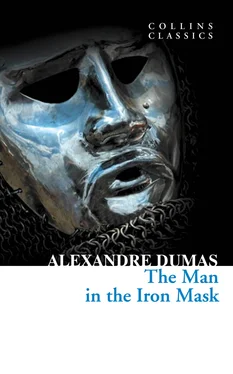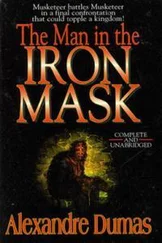Alexandre Dumas
Cover
Title Page THE MAN IN THE IRON MASK Alexandre Dumas
Introduction
Chapter 1 The Prisoner.
Chapter 2 How Mouston Had Become Fatter without Giving Porthos Notice Thereof, and of the Troubles Which Consequently Befell that Worthy Gentleman.
Chapter 3 Who Messire Jean Percerin Was.
Chapter 4 The Patterns.
Chapter 5 Where, Probably, Moliere Obtained His First Idea of the Bourgeois Gentilhomme.
Chapter 6 The Bee-Hive, the Bees, and the Honey.
Chapter 7 Another Supper at the Bastille.
Chapter 8 The General of the Order.
Chapter 9 The Tempter.
Chapter 10 Crown and Tiara.
Chapter 11 The Chateau de Vaux-le-Vicomte.
Chapter 12 The Wine of Melun.
Chapter 13 Nectar and Ambrosia.
Chapter 14 A Gascon, and a Gascon and a Half.
Chapter 15 Colbert.
Chapter 16 Jealousy.
Chapter 17 High Treason.
Chapter 18 A Night at the Bastille.
Chapter 19 The Shadow of M. Fouquet.
Chapter 20 The Morning.
Chapter 21 The King’s Friend.
Chapter 22 Showing How the Countersign Was Respected at the Bastille.
Chapter 23 The King’s Gratitude.
Chapter 24 The False King.
Chapter 25 In Which Porthos Thinks He Is Pursuing a Duchy.
Chapter 26 The Last Adieux.
Chapter 27 Monsieur de Beaufort.
Chapter 28 Preparations for Departure.
Chapter 29 Planchet’s Inventory.
Chapter 30 The Inventory of M. de Beaufort.
Chapter 31 The Silver Dish.
Chapter 32 Captive and Jailers.
Chapter 33 Promises.
Chapter 34 Among Women.
Chapter 35 The Last Supper.
Chapter 36 In M. Colbert’s Carriage.
Chapter 37 The Two Lighters.
Chapter 38 Friendly Advice.
Chapter 39 How the King, Louis XIV., Played His Little Part.
Chapter 40 The White Horse and the Black.
Chapter 41 In Which the Squirrel Falls,—the Adder Flies.
Chapter 42 Belle-Ile-en-Mer.
Chapter 43 Explanations by Aramis.
Chapter 44 Result of the Ideas of the King, and the Ideas of D’Artagnan.
Chapter 45 The Ancestors of Porthos.
Chapter 46 The Son of Biscarrat.
Chapter 47 The Grotto of Locmaria.
Chapter 48 The Grotto.
Chapter 49 An Homeric Song.
Chapter 50 The Death of a Titan.
Chapter 51 Porthos’s Epitaph.
Chapter 52 M. de Gesvres’s Round.
Chapter 53 King Louis XIV.
Chapter 54 M. Fouquet’s Friends.
Chapter 55 Porthos’s Will.
Chapter 56 The Old Age of Athos.
Chapter 57 Athos’s Vision.
Chapter 58 The Angel of Death.
Chapter 59 The Bulletin.
Chapter 60 The Last Canto of the Poem.
Epilogue
Classic Literature: Words and Phrases Adapted from the collins english dictionary
About the Author
History of Collins
Copyright
About the Publisher
In the months of March—July in 1844, in the magazine Le Siecle , the first portion of a story appeared, penned by the celebrated playwright Alexandre Dumas. It was based, he claimed, on some manuscripts he had found a year earlier in the Bibliotheque Nationale while researching a history he planned to write on Louis XIV. They chronicled the adventures of a young man named D’Artagnan who, upon entering Paris, became almost immediately embroiled in court intrigues, international politics, and ill-fated affairs between royal lovers. Over the next six years, readers would enjoy the adventures of this youth and his three famous friends, Porthos, Athos, and Aramis, as their exploits unraveled behind the scenes of some of the most momentous events in French and even English history.
Eventually these serialized adventures were published in novel form, and became the three D’Artagnan Romances known today. Here is a brief summary of the first two novels:
The Three Musketeers (serialized March—July, 1844): The year is 1625. The young D’Artagnan arrives in Paris at the tender age of 18, and almost immediately offends three musketeers, Porthos, Aramis, and Athos. Instead of dueling, the four are attacked by five of the Cardinal’s guards, and the courage of the youth is made apparent during the battle. The four become fast friends, and, when asked by D’Artagnan’s landlord to find his missing wife, embark upon an adventure that takes them across both France and England in order to thwart the plans of the Cardinal Richelieu. Along the way, they encounter a beautiful young spy, named simply Milady, who will stop at nothing to disgrace Queen Anne of Austria before her husband, Louis XIII, and take her revenge upon the four friends.
Twenty Years After (serialized January—August, 1845): The year is now 1648, twenty years since the close of the last story. Louis XIII has died, as has Cardinal Richelieu, and while the crown of France may sit upon the head of Anne of Austria as Regent for the young Louis XIV, the real power resides with the Cardinal Mazarin, her secret husband. D’Artagnan is now a lieutenant of musketeers, and his three friends have retired to private life. Athos turned out to be a nobleman, the Comte de la Fere, and has retired to his home with his son, Raoul de Bragelonne. Aramis, whose real name is D’Herblay, has followed his intention of shedding the musketeer’s cassock for the priest’s robes, and Porthos has married a wealthy woman, who left him her fortune upon her death. But trouble is stirring in both France and England. Cromwell menaces the institution of royalty itself while marching against Charles I, and at home the Fronde is threatening to tear France apart. D’Artagnan brings his friends out of retirement to save the threatened English monarch, but Mordaunt, the son of Milady, who seeks to avenge his mother’s death at the musketeers’ hands, thwarts their valiant efforts. Undaunted, our heroes return to France just in time to help save the young Louis XIV, quiet the Fronde, and tweak the nose of Cardinal Mazarin.
The third novel, The Vicomte de Bragelonne (serialized October, 1847—January, 1850), has enjoyed a strange history in its English translation. It has been split into three, four, or five volumes at various points in its history. The five-volume edition generally does not give titles to the smaller portions, but the others do.
The Vicomte de Bragelonne : It is the year 1660, and D’Artagnan, after thirty-five years of loyal service, has become disgusted with serving King Louis XIV while the real power resides with the Cardinal Mazarin, and has tendered his resignation. He embarks on his own project, that of restoring Charles II to the throne of England, and, with the help of Athos, succeeds, earning himself quite a fortune in the process. D’Artagnan returns to Paris to live the life of a rich citizen, and Athos, after negotiating the marriage of Philip, the king’s brother, to Princess Henrietta of England, likewise retires to his own estate, La Fere. Meanwhile, Mazarin has finally died, and left Louis to assume the reigns of power, with the assistance of M. Colbert, formerly Mazarin’s trusted clerk. Colbert has an intense hatred for M. Fouquet, the king’s superintendent of finances, and has resolved to use any means necessary to bring about his fall. With the new rank of intendant bestowed on him by Louis, Colbert succeeds in having two of Fouquet’s loyal friends tried and executed. He then brings to the king’s attention that Fouquet is fortifying the island of Belle-Ile-en-Mer, and could possibly be planning to use it as a base for some military operation against the king. Louis calls D’Artagnan out of retirement and sends him to investigate the island, promising him a tremendous salary and his long-promised promotion to captain of the musketeers upon his return. At Belle-Isle, D’Artagnan discovers that the engineer of the fortifications is, in fact, Porthos, now the Baron du Vallon, and that’s not all. The blueprints for the island, although in Porthos’s handwriting, show evidence of another script that has been erased, that of Aramis. D’Artagnan later discovers that Aramis has become the bishop of Vannes, which is, coincidentally, a parish belonging to M. Fouquet. Suspecting that D’Artagnan has arrived on the king’s behalf to investigate, Aramis tricks D’Artagnan into wandering around Vannes in search of Porthos, and sends Porthos on an heroic ride back to Paris to warn Fouquet of the danger. Fouquet rushes to the king, and gives him Belle-Isle as a present, thus allaying any suspicion, and at the same time humiliating Colbert, just minutes before the usher announces someone else seeking an audience with the king.
Читать дальше












